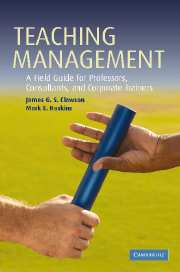Book contents
- Frontmatter
- Contents
- List of figures
- Sources to chapter quotations
- Why this book on teaching management?
- 1 Fundamental elements in teaching
- 2 Levels of learning: one, two, and three
- 3 Adult learning theory: it matters
- 4 Planning a course: trips and tips
- 5 Planning a class: no detail is too small
- 6 Lecturing: the possibilities and the perils
- 7 Managing discussions
- 8 Case method: fostering multidimensional learning
- 9 Role-playing
- 10 Case writing: crafting a vehicle of interest and impact
- 11 Case teaching notes: getting from here to there
- 12 Action learning
- 13 Experiential methods
- 14 Enhancing the conversation: audiovisual tools and techniques
- 15 Executive education: contributing to organizational competitive advantage
- 16 Using technology to teach management
- 17 Counseling students
- 18 Evaluating students: the twin tasks of certification and development
- 19 Teaching evaluations: feedback that can help and hurt
- 20 Research presentations
- 21 Managing a degree program: behind the ‘glory’
- 22 Managing a nondegree client program: an overview
- 23 Dealing with the press
- 24 Managing yourself and your time
- 25 Using teaching portfolios and course portfolios
- 26 Conclusion: is this on the exam?
- Index
7 - Managing discussions
Published online by Cambridge University Press: 25 February 2010
- Frontmatter
- Contents
- List of figures
- Sources to chapter quotations
- Why this book on teaching management?
- 1 Fundamental elements in teaching
- 2 Levels of learning: one, two, and three
- 3 Adult learning theory: it matters
- 4 Planning a course: trips and tips
- 5 Planning a class: no detail is too small
- 6 Lecturing: the possibilities and the perils
- 7 Managing discussions
- 8 Case method: fostering multidimensional learning
- 9 Role-playing
- 10 Case writing: crafting a vehicle of interest and impact
- 11 Case teaching notes: getting from here to there
- 12 Action learning
- 13 Experiential methods
- 14 Enhancing the conversation: audiovisual tools and techniques
- 15 Executive education: contributing to organizational competitive advantage
- 16 Using technology to teach management
- 17 Counseling students
- 18 Evaluating students: the twin tasks of certification and development
- 19 Teaching evaluations: feedback that can help and hurt
- 20 Research presentations
- 21 Managing a degree program: behind the ‘glory’
- 22 Managing a nondegree client program: an overview
- 23 Dealing with the press
- 24 Managing yourself and your time
- 25 Using teaching portfolios and course portfolios
- 26 Conclusion: is this on the exam?
- Index
Summary
A good question is worth a thousand answers.
Socrates, probably the most famous discussion teacher ever, developed the dialectical approach of asking questions that stimulated student thinking and subsequent discussion. Although the discussion technique has this long and well-established history, it is for many instructors a focus of concern and fear. The idea of relinquishing some control over the focus of a class and the uncertainty of what questions students will ask can be daunting to those of us with lesser intellect and confidence than Socrates. It need not be so. The key is to let go of the often-held idea that the professor has to know it all and to accept that it may be legitimate and professional to say, “I don't know. Let's find out.”
The issue of control is a critical one. The first related premise here is that the people in the room have some background, experience, intelligence, and insight to share. Without making that assumption, an instructor is not likely to look for ways to bring all those things out and into the class. Without that assumption, the instructor is likely to continue trying to control the “air time,” concepts introduced, and direction of the class. Without that assumption, the instructor is likely to lecture.
So, in some ways, managing a discussion is like conducting an orchestra. There are a variety of melodies to play, experiences to benefit from, intellects to open up and discover, and theories to examine.
Information
- Type
- Chapter
- Information
- Teaching ManagementA Field Guide for Professors, Consultants, and Corporate Trainers, pp. 103 - 118Publisher: Cambridge University PressPrint publication year: 2006
